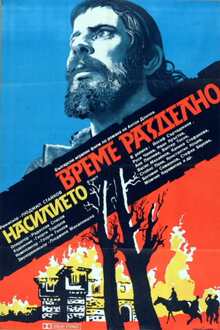fiction.wikisort.org - Movie
Time of Violence (Bulgarian: Време на насилие) is a 1988 Bulgarian film based on the novel Time of Parting by Anton Donchev. It consists of two episodes with a combined length of 288 minutes. It premiered at the 1988 Cannes Film Festival where it was screened in the Un Certain Regard section.[1] The film was selected as the Bulgarian entry for the Best Foreign Language Film at the 62nd Academy Awards.[2]
| Time of Violence | |
|---|---|
 Theatrical release poster | |
| Directed by | Ludmil Staikov |
| Written by | Georgi Danailov |
| Based on | Time of Parting by Anton Donchev |
| Produced by | Hristo Nenov |
| Starring |
|
| Cinematography | Radoslav Spasov |
| Edited by | Violeta Toshkova |
| Music by | Georgi Genkov |
| Distributed by | Boyana Film |
Release date |
|
Running time | 288 minutes |
| Country | Bulgaria |
| Language | Bulgarian |
Plot
The film is set in the Ottoman Empire, in 1668. As Köprülü Fazıl Ahmed Pasha concentrates his war efforts on the Cretan War, he grows paranoid of the Sultan's Christian subjects, convinced that they are an uncontrollable threat to the empire unless Islamized. One of the targets is Elindenya, a village located in a Rhodope valley where the Christian Bulgarians' way of life was for the most part left alone under the Ottoman governor Süleyman Agha's rule. A sipahi regiment is dispatched to the valley with the mission of converting the Christian population to Islam, by force if necessary. The extraordinary thing is that the regiment is led by Kara Ibrahim, a fanatical devshirme from Elindenya, and although Süleyman Agha, feeling that his self-ordained rule is at stake, objects to forced conversions, Kara Ibrahim favors measures of extreme brutality against the local Bulgarians, including his own family.
Cast
- Yosif Sarchadzhiev as Kara Ibrahim
- Rusi Chanev as Pop Aligorko
- Ivan Krastev as Manol
- Anya Pencheva as Sevda
- Valter Toski as the Venetian
- Vasil Mihaylov as Süleyman Aga
- Kalina Stefanova as Elitza
- Max Freeman as Momchil
- Konstantin Kotsev as Dyado Galushko
- Stoyko Peev as Goran
- Bogomil Simeonov as Ismail Bey
- Djoko Rosic as Kara Hasan
- Velko Kanev as Köprülü Fazıl Ahmed Pasha
- Stefka Berova as Gyulfie
- Angel Ivanov as Mircho
- Nikola Todev as Stoyko Protsvet
See also
- List of submissions to the 62nd Academy Awards for Best Foreign Language Film
- List of Bulgarian submissions for the Academy Award for Best Foreign Language Film
References
- "Festival de Cannes: Time of Violence". festival-cannes.com. Retrieved 2009-07-31.
- Margaret Herrick Library, Academy of Motion Picture Arts and Sciences
External links
- Time of Violence at IMDb
На других языках
- [en] Time of Violence
[ru] Время насилия
«Время насилия»[2] (болг. Време на насилие) — болгарский художественный фильм-драма 1988 года режиссёра Людмила Стайкова по сценарию Людмила Стайкова, Георги Данаилова, Михаила Киркова и Радослава Спасова. Экранизация романа Антона Дончева «Час выбора».Другой контент может иметь иную лицензию. Перед использованием материалов сайта WikiSort.org внимательно изучите правила лицензирования конкретных элементов наполнения сайта.
WikiSort.org - проект по пересортировке и дополнению контента Википедии